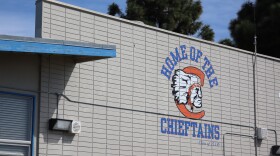San Diego's Metropolitan Transit System (MTS) is seeking input on how to deal with a looming budget deficit of roughly $120 million.
MTS On Track is a new public outreach campaign asking San Diegans how they want the agency to spend new revenue, should it materialize — either via state funding or a local ballot measure.
Just looking at ridership numbers, San Diego's transit system is doing fairly well. MTS recently reported a new post-pandemic high of 81 million passenger trips taken in the fiscal year that ended June 30. That's an increase of 7% compared to the prior fiscal year. The agency has also reported the second highest ridership growth in the country since 2020.
MTS CEO Sharon Cooney attributed the success to improvements to the passenger experience, such as increased security.
"We heard loud and clear that people wanted to feel safe as they traversed our transit network," Cooney said. "We've also been adding services. The Mid-Coast trolley extension opened up right during the pandemic. We've also increased bus service on various routes."
But those improvements have come at a cost, and at a time when inflation has been touching almost everything in the MTS budget, from employee salaries to the fuel and electricity that powers its vehicles.
"Government subsidies and the fares have not been keeping up with the inflationary impacts," Cooney said. "And it's really not just MTS that's suffering from this. This is a problem all across the United States right now."
MTS aims to turn the comments gathered online and at in-person outreach events into a service improvement plan that would go before its board of directors early next year. The plan would be enacted only if the agency receives new revenue.
In summer 2026, MTS plans to gather input on what to do if it doesn't receive new revenue. Cooney said the necessary service cuts, which would amount to roughly 25% of its operating budget, would hurt transit riders and non-riders alike.
"One of the great things about transit is it's there for everybody," Cooney said. "Even if you don't use it on a regular basis, you might use it to go to a game or a medical appointment, school. You have children, they need it. This is a time when we really need to start focusing our efforts on avoiding that fiscal cliff."






